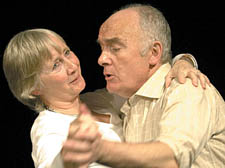|
|
 |
| |
A philosopher is born again
ON RELIGION
Soho Theatre
THEY were queuing up for returns on Tuesday night at the Soho Theatre to see the scholar A C Grayling’s think piece about the most controversial subject of the moment.
Informed by leading theologians, scientists and directed by the National Theatre’s associate director Mick Gordon, his script explores one of history’s great philosophical puzzlers: reason versus religion.
Grayling takes a happy family and rips them to shreds.
He shows how belief divides children from their parents in a liberal household, which is his microcosm of the modern world.
The sceptic professor Grace (Gemma Jones) – who wants to pass off spiritual feelings as electrical imbalances in the brain – suffers a near mental breakdown when her son Tom (Elliot Levely), an erudite barrister, announces he has been born-again and is pursuing a career as a Christian priest.
When Tom dies Grace refuses to honour his dying wish, for a mass to be held at his funeral.
Tom’s pregnant partner Ruth (Priyanga Burford) delivers a rousing rendition of Larkin’s This Be The Verse – “they fuck you up your mum and dad… Man hands on misery to man” – at the funeral.
The rift, Grayling implies, will be felt for generations.
Tom’s lines chimed of Tony Blair but it was the moral imperialism of his ‘naturalist’ mother that came across as most destructive.
She walked the stage like a howling King Lear, red-eyed and full of anguish. Each time she gazed out over the audience while lost in thought it felt like she was being stirred by some great landscape.
The performance of the night came from Burford, whose five-minute monologue, directed towards the heavens with clenched fists drew a spontaneous cheer from the crowd.
We are constantly reminded of the destructive legacy of
religion.
Science and evolution will always be used to counter faith in the enlightened world. But Grayling’s play probes new depths of the well-worn subject, putting a powerful case for “kindness”.
We are made to think about how it is that a sophisticated and knowledgeable man from a liberal, cultured background can suddenly be born again.
I met Grayling before the show and he confessed his debt to the essays of the 16th-century humanist Michel de Montaigne.
The French philosopher, whose work inspired Shakespeare, wrote reams of discourse about himself in pursuit of the human condition.
His most celebrated essay explored his disgust with the religious conflict of his time while defending what he described as “illuminated” Christianity. He asked, “What do I know, but myself?”
This is the foundation of On Religion, superb in all departments, which is surely set for bigger things.
Until January 7
0870429 6883
|
 |
|
|
 |
|



